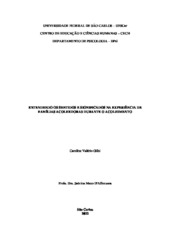Entendendo os sentidos e significados na experiência de famílias acolhedoras durante o acolhimento
Abstract
The "Welcoming Families" program is an alternative to institutional care. It consists of training voluntary families to exercise the temporary care of children and adolescents away from the family by judicial decision. This study seeks to investigate the representations, motivations, difficulties and the role of psychology in promoting a healthy host family. Three families and two psychology professionals from the "Welcoming Families" from two cities in the interior of the state of São Paulo participated in the research. Remote interviews were conducted with the participants, who responded to a semi-structured interview script prepared by the author. The interviews were recorded, transcribed and qualitatively analyzed.. The data will be coded and grouped into categories of analysis, for further discussion based on the literature of the area.The results point to the role of psychology in promoting a healthy host family, as well as the complexity of the families' experience. In addition, it presents itself as an alternative to institutional care because, as a result of healthy bonds, they were brought as a reference, it brings possibilities for the child to build new relationships and reorganize their reality with the help of new figures of affection.
Collections
The following license files are associated with this item:

